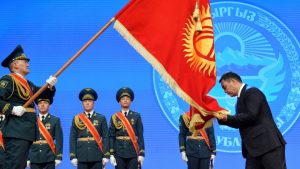Nearly four months after being busted out of prison, populist politician Sadyr Japarov was sworn in as Kyrgyzstan’s president on January 28. Japarov sailed past all other presidential contenders with 79 percent of the vote in the January 10 election, which saw dismal turnout. In the same election, voters overwhelmingly supported ditching the parliamentary system.
Though only just now sworn in, Japarov has effectively ruled Kyrgyzstan since the October turmoil and steered it toward this very end: a return to presidential rule with himself at the top.
Kyrgyz lawmakers are working out a draft of a new constitution. An earlier version was dubbed the “Khanstitution” and the moniker may stick, even as the particulars of the document shift. One reported feature of the draft constitution is a unique consolidation of power in the executive branch: The president’s chief of staff would head the government (under the current parliamentary system the prime minister is head of the government).
A date has not been set yet for a second referendum. Critics fear Japarov’s government will find a way to push through a new constitution without much public discussion.
Japarov’s core government experience before his recent rise was as a nationalistic and agitating MP. He fled the country in 2013 after a protest he’d instigated in Karakol got out of hand, with protesters attempting to kidnap the regional governor. Japarov returned to Kyrgyzstan in 2017 and was swiftly arrested and convicted of orchestrating the kidnapping.
It’s this history that endears Japarov to his supporters, even as it confounds his critics. During his time in prison, Japarov, 52, lost both his parents and one of his sons died in a car accident. The image of Japarov as a man unfairly persecuted by a corrupt system strikes a chord with many Kyrgyz, but others see him as just another in a long line of corrupt politicians accumulating power.
The concentration of power in Japarov’s hands raises worries far beyond Kyrgyzstan’s borders and his lack of governmental experience casts a pall over his big promises.
“Our goal is to create a society with a dictatorship of the law, where justice and prosperity reign,” Japarov said in his inaugural remarks at the National Philharmonic Hall in Bishkek, borrowing a phrase most associated with Russian President Vladimir Putin.
In his inaugural speech, Japarov repeatedly returned to the theme of “unity.” He made common political promises: prosperity, economic development, cracking down on corruption. But Japarov also called for a “cultural revival.”
Japarov touched on the pandemic, though primarily through the economic lens. With regard to economic matters more broadly, Japarov lamented that so many Kyrgyz travel abroad for employment and promised to boost job growth through the implementation of several large projects, including the Kambar-Ata dam, the Sary-Jaz hydroelectric power plant, and Upper Naryn Cascade. All three projects have troubled histories of fits and starts, various plans and varied investors, then delays and delays. Japarov also noted Kyrgyzstan’s debt problems, mentioning $5 billion in foreign and domestic debt.
Turning to foreign affairs, Japarov pledged a multi-vector foreign policy but also called out several specific partners for strengthening cooperation, economic, and cultural ties including Russia, Kazakhstan, and Uzbekistan. He also highlighted Turkey in that group. Regarding China, Japarov expressed the hope that mutually beneficial economic relations would continue to grow. Japarov also said he would strive to cooperate with the United States, Europe, and other Asian countries in addition to a litany of international organizations and groups including the United Nations, the Shanghai Cooperation Organization, the Eurasian Economic Union, and the Turkic Council.
Japarov called on Kyrgyzstan’s ancient history for grounding, naturally, declaring that the future of a nation with such a long history must be bright. In the end, he returned to the unity theme: “Dear Kyrgyzstanis, dear compatriots, I urge you to unite and together open a new page in our history!”
In attendance at the inauguration was former President Soornbay Jeenbekov, who resigned in mid-October arguably under the direct pressure of Japarov and his supporters. His attendance highlights the curious fact that he is, currently, Kyrgyzstan’s only past president (not counting acting presidents) not on the run or in jail. Kyrgyzstan’s first two presidents were overthrown in 2005 and 2010, respectively, and subsequently fled into exile, where they remain. Jeenbekov’s immediate predecessor, Almazbek Atambayev, is in jail and continues to face charges related to corruption and the August 2019 events in Koi-Tash.
Other political figures have been arrested, returned to detention after being on house arrest, or denied release in more recent days, too. A relative of Jeenbekov’s, Aibek Tokoev was arrested on corruption charges; former Deputy Interior Minister Kursan Asanov was returned to pre-trial detention; and former Prime Minister Mukhammedkalyi Abylgaziev was detained on corruption charges. Meanwhile, Atambayev is seeking release to house arrest due to illness but has not yet received it and Raimbek Matraimov’s case is set to begin next week.

































